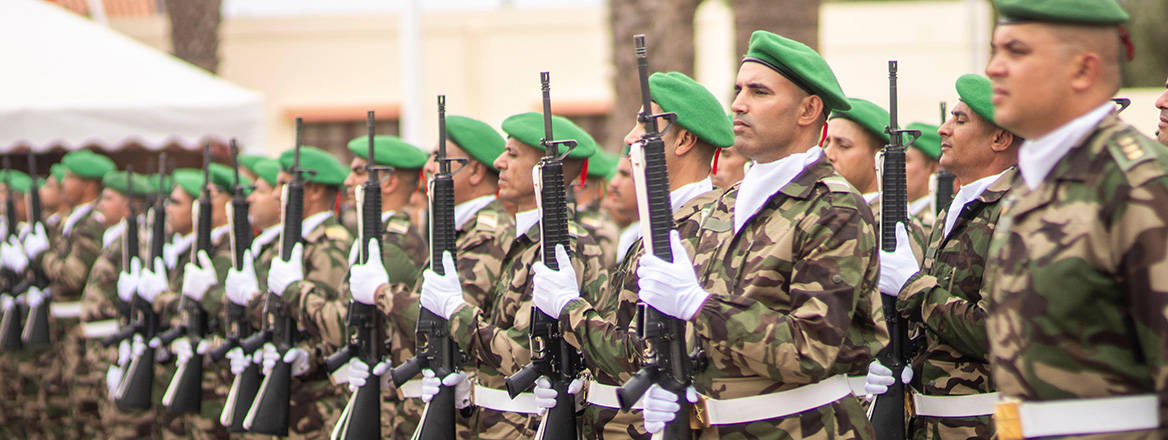Morocco as a Strategic Partner in Supporting the Sahel Region’s Security
Morocco’s strategic role in promoting stability in the Sahel is central to tackling transnational threats, with initiatives like the Atlantic Initiative fostering regional security cooperation.
Introduction
Nicholas Hopton and Burcu Ozcelik
In recent years, Morocco has emerged as a key player in supporting stability in the Sahel, leveraging its strategic position, deep historical ties, and economic and infrastructure development partnerships to promote cross-border security cooperation. In December 2024, RUSI convened a roundtable discussion to explore ‘The Geopolitics of the Sahel: Transnational Threats, Security and Stability’.
The Sahel has emerged as a critical geopolitical region where the UK and its allies face consequential policy decisions related to security, stability, cross-border organised crime, terrorism, illegal migration and illicit finance. Similarly, Morocco’s policy priorities and national security are deeply connected to, and influenced by, developments in the Sahel. As a historical bridge between North and West Africa, Morocco is uniquely positioned to act as a stabilising force, using a mix of diplomatic, economic and security tools to support sustainable development and security in the Sahel. Rabat has taken a number of strategic steps to emerge as a key security partner to the UK and Europe.
One of the most ambitious steps taken by Rabat is the recent Morocco Atlantic Initiative, which aims to provide landlocked Sahel countries with access to vital maritime trade routes via Morocco’s Atlantic port infrastructure. The plan aims to foster economic regional integration to reduce dependence on unstable transit routes, while fostering Morocco’s ties with its southern neighbours to counter instability, terrorism and illicit trafficking in the region in the long term. Economic integration and stability would align with the UK’s interest in promoting stability and security for the region’s peoples.
Morocco’s engagement with the Sahel is also deeply embedded in broader geo-economic partnerships to strengthen regional integration, such as the Nigeria-Morocco Gas Pipeline, which aims to connect West African energy resources to North Africa and Europe. While there are many security, political and diplomatic challenges facing the region, Morocco’s investments in infrastructure, banking and telecommunications illustrate its commitment to economic interdependence to counter extremism and promote sustainable partnerships.
The following commentary by Beatriz de León Cobo is based on the author’s remarks presented at the roundtable.
Why Cross-Border Collaboration is Needed to Tackle the Sahel’s Challenges
Beatriz de León Cobo
The Sahel region of Africa continues to face urgent security challenges, with far-reaching consequences for both the continent and its international partners. Stretching across the expanse of West Africa from Senegal to Sudan, the Sahel has long been susceptible to threats such as terrorism, insurgency, illicit trafficking, and governance crises. Over the past decade, the region has experienced a significant surge in jihadist violence, mostly carried out by groups affiliated with al-Qa’ida and Islamic State. These armed actors take advantage of porous borders, fragile states, and local grievances to extend their operational reach. This article will focus on the central Sahel region and its bordering areas in the Maghreb and West Africa.
In January 2025, a year on from the initial announcement of their intention to do so, Burkina Faso, Mali and Niger officially withdrew from the Economic Community of West African States (ECOWAS). These three countries, all members of the Alliance of Sahel States (AES), continued to deepen their integration while leaving the West African community. Originally formed to address common security threats, the AES soon evolved into a platform for these governments to assert a new vision of sovereignty and partnership. This departure marks a major upheaval in the regional architecture, affecting trade, freedom of movement, and collective security frameworks.
During an ECOWAS summit in Abuja, the three AES states formally rejected a proposal to delay their departure by six months, opting instead for a more immediate exit, despite intense diplomatic efforts by President Bassirou Diomaye Faye of Senegal and President Faure Gnassingbé of Togo. In response to the withdrawal, ECOWAS indicated it would maintain a ‘status quo’ while organising exit talks with the AES. A statement released on 29 January 2025 confirmed that AES citizens holding ECOWAS-issued documents would retain recognition of their passports and identification cards until further notice. Goods and services originating from Burkina Faso, Mali and Niger would also remain subject to ECOWAS trade policies for the time being. According to ECOWAS officials, these steps aim to prevent abrupt disruptions, mitigate economic fallout, and keep dialogue channels open.
Access to Morocco’s ports for Sahel countries offers a critical corridor to global markets, reducing their reliance on other neighbours
Nevertheless, the long-term outcome remains uncertain. Negotiators suggest transitional arrangements may include a grace period, followed by bilateral accords to address specific security and trade issues. Whether these interim measures will be sufficient to avert further instability remains to be seen. What is evident, however, is that the AES’s departure represents a watershed moment that could reshaping economic, security, social, migratory and diplomatic relations in West Africa. Given that Burkina Faso, Mali and Niger occupy strategic areas of the Sahel, this separation has sparked concerns about the future of regional security and border cooperation. Observers fear a split in ECOWAS unity could undermine the region’s collective ability to combat transnational threats.
Almost in tandem with their ECOWAS withdrawal, the AES governments unveiled plans for a unified military force of 5,000 soldiers. Each of the three AES armies are expected to contribute troops, tasked with conducting joint operations in areas of intense jihadist activity. In their view, establishing a self-sufficient military partnership is the most dependable way to safeguard sovereignty. However, logistical coordination and consistent funding will be critical; previous initiatives, such as the G5 Sahel Joint Force, struggled with both.
Although 5,000 soldiers is a starting point, it will not be enough to secure a vast, geographically challenging territory spanning nearly three million square kilometres. Sustained success will require ongoing intelligence sharing, air support, and potentially selective partnerships for air capabilities. Partners for the latter may include non-Western powers such as Russia, Turkey or China, which have already been providing bilateral military assistance and equipment.
At a time when AES countries are seeking to diversify their partnerships – as evidenced by the continued closure of Western military bases, including the US base in Niger in August 2024 and France’s base in Chad in December 2024 – other actors such as regional states are assuming more prominent roles. For instance, North African countries have heightened their involvement. Algeria, given its borders and historical ties to Mali, has always played a pivotal role in the region. Since the renewal of hostilities in northern Mali at the end of 2023, Algeria has once again been drawn into security and diplomatic tensions in the border area, particularly following clashes between armed groups and government forces in Tinzawaten, which lies right on the Algerian border. Another Maghreb country that has been intensifying its diplomatic and economic efforts to extend its influence across the Sahel is Morrocco, which has been providing development aid and infrastructure investments while positioning itself as a reliable partner to the military governments in the Central Sahel – particularly after ECOWAS sanctions led to border closures, preventing access to crucial harbours.
At the same time, Morocco is championing the ‘Atlantic Initiative’, a strategy designed to offer Sahel countries another means of accessing the Atlantic Ocean via Moroccan ports, introducing an alternative trade route and strengthening road infrastructure. Because these countries are landlocked, access to Morocco’s ports offers a critical corridor to global markets, reducing their reliance on other neighbours. Another example of Morocco’s infrastructure and development partnership with the Central Sahel is its investment in a power plant in Niamey, inaugurated in December 2024. Niger had suffered electricity shortages due to sanctions imposed after its coup, and Morocco’s support helped reinforce Niger’s energy sovereignty.
Despite the changing landscape, Western partners have not fully disengaged from the Sahel. Many donor-funded programmes continue in sectors such as health, education and agriculture, recognising that security challenges often emerge from socio-economic disparities. The effectiveness of these programmes depends on strong collaboration with local authorities, who remain cautious of foreign interference. However,� President Donald Trump’s decision in January 2025 to pause US foreign aid is having and will continue to have disruptive repercussions and has fuelled mistrust towards Western donors. This is therefore a critical moment for international donors to reinforce their support for Sahelian and West African populations during this period, recognising the importance of cross-border dynamics and collaborating with regional powers as needed.
Success in achieving peace and prosperity in the Sahel and the West African region depends on cohesive, collective efforts that transcend national boundaries
One of the clearest lessons to emerge from the escalating violence in the Sahel is that jihadist insurgencies are not confined by national borders. Armed groups exploit weak governance and local grievances in border regions to establish cross-border supply lines, recruitment networks, and safe havens. Understanding this dynamic is crucial for any analysis of how security vacuums in the Sahel can spill over into neighbouring states. Jihadist organisations in the Sahel are far from monolithic. They adapt to military pressure, political changes, and shifting alliances, posing a formidable challenge for regional governments and their international allies. For nearly a decade, Bamako, the capital of Mali, had been spared high-profile jihadist attacks. That changed in September 2024, when Jama'at Nusrat al-Islam wal-Muslimin targeted both the École de Gendarmerie and the airport, resulting in multiple casualties and reviving memories of attacks on hotels and restaurants in the mid-2010s. In January 2025, two high-profile kidnappings involving Western nationals – in southern Algeria and in Niger’s Agadez region – demonstrated the fluid collaboration between various criminal, bandit and jihadist networks. These groups often cooperate along the so-called ‘kidnapping supply chain’, from identifying targets to ransom negotiations.
Extremist violence once primarily localised in Mali, Niger and Burkina Faso is gradually expanding into northern areas of coastal states such as Benin, Togo and, to a lesser degree, Ghana. Coastal states have therefore also become increasingly vocal about the southward spillover. Should cooperation between AES and these ECOWAS members weaken, their shared ability to conduct joint security operations and implement coordinated border controls would diminish, thereby increasing the risk of terrorist infiltration.
In conclusion, the West African security environment remains precarious, shaped by changing alliances, rising terrorist activity, and shifting international partnerships. The decision by Burkina Faso, Mali and Niger to leave ECOWAS and form the AES reflects a drive for self-reliance and diversified alliances. However, it also highlights the fragility of regional cooperation at a time when cross-border threats are intensifying. Sustained security responses will require robust intelligence sharing, joint operations, and socio-economic investments that address the root causes of conflict. Above all, the imperative of cross-border collaboration cannot be overstated. Whether through partnerships or coordination with regional and international actors, success in achieving peace and prosperity in the Sahel and the West African region depends on cohesive, collective efforts that transcend national boundaries.
© RUSI, 2025
The views expressed in this Commentary are the authors’, and do not represent those of RUSI or any other institution.
For terms of use, see Website Ts&Cs of Use.
Have an idea for a Commentary you’d like to write for us? Send a short pitch to commentaries@rusi.org and we’ll get back to you if it fits into our research interests. Full guidelines for contributors can be found here.
WRITTEN BY
Beatriz de León Cobo
RUSI Associate Fellow, International Security
Nicholas Hopton
RUSI Distinguished Fellow, International Security
Dr Burcu Ozcelik
Senior Research Fellow, Middle East Security
International Security
- Jim McLeanMedia Relations Manager+44 (0)7917 373 069JimMc@rusi.org





